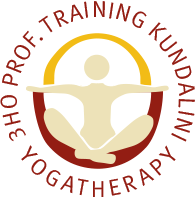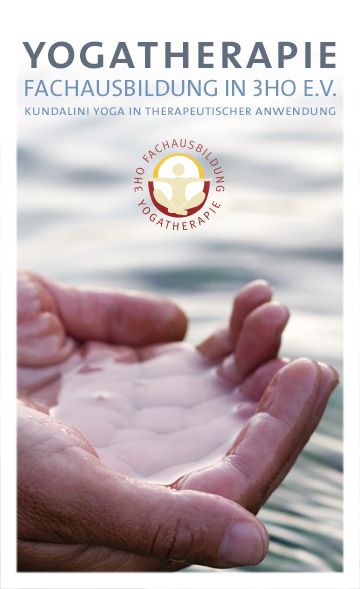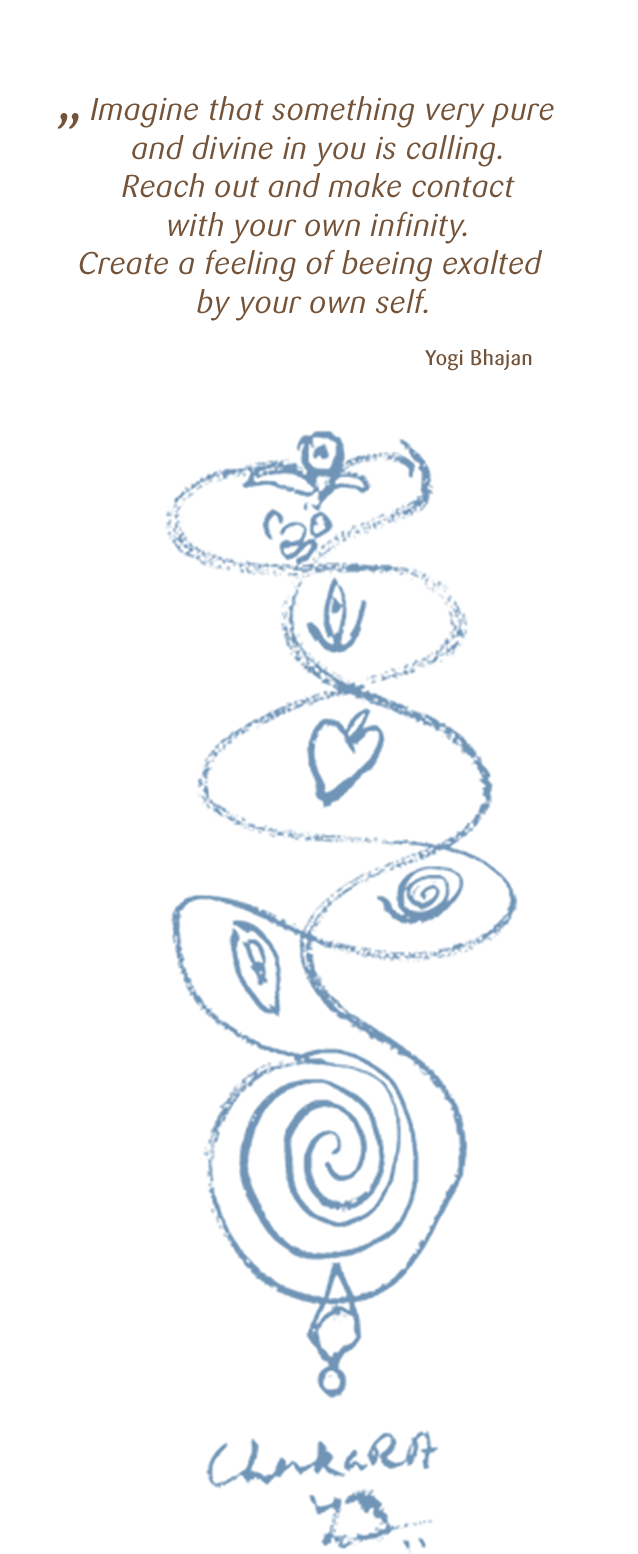GOALS OF KUNDALINI YOGA THERAPY PROFESSIONAL TRAINING
This professional training course is designed as a basic training for yoga therapists. The goal is to equip people with the necessary means to use Kundalini Yoga therapeutically. The approach of the training is based on the knowledge that all individuals carry within themselves the resources and means to become healthy and creative human beings. Through attentiveness and respect, yoga therapy creates the necessary conditions for the healing and growth of the body, mind, and soul.
We consider therapy-focused Kundalini Yoga to be both a preventative and therapeutic approach. The training will focus equally on the psychological and physical aspects of healing. We teach our trainees to evaluate the specific needs of each client and to design a yoga therapy program to meet those needs. Another component of the training is the development of skills for the therapeutic work with groups, which share a common topic or diagnosis.
Yogi Bhajan bestowed a rich treasure chest of knowledge and healing methods upon us. We will pass these on as practical tools and explore their therapeutic efficacy. A central focus is to delve into the knowledge base of kriyas and meditation to convey a more in-depth understanding of their subtle effects. Yoga therapy is an ideal answer to the complex challenges of our time.
The training will enable the trainees to work with yoga therapeutically, in individual and / or groups settings. All yoga teachers will benefit from a deepening of their yogic knowledge and their consultation skills, allowing for more differentiated and knowledgeable teaching.
Course Content
Consultation expertise and therapeutic communication
Within consultation and evaluation settings, complex processes arise. These cannot be sufficiently resolved using fixed approaches or formulas. They require flexible, process-orientated communication skills, which will be presented and practiced in this module. This module includes basic therapeutic skills, conversational skills, therapeutic demeanor, handling difficult conversational situations, limitations, and opportunities of yoga therapy.
Awaking the body’s potential
In Yoga, healing means re-establishing, strengthening, and harmonizing the connection between body, mind, and soul. The focus of this module is to understand this connection and to facilitate and support the healing process through the practice of Kundalini Yoga. In this way, clients with specific concerns or with physical limitations can be treated with higher levels of competence and with more options. In addition, this module will deepen and build upon existing knowledge of asana alignment and the major body systems. Particular focus is placed on how to employ these in a practical and relevant way.
“EAT, BREATHE, LOVE” – A YOGIC LIFESTYLE STRENGTHENS BOTH HEALTH AND THE SPIRIT
This module is dedicated to the important pillars of a yogic lifestyle, which act as a framework and complement to the asana practice. On the first weekend, we approach the question of how to incorporate suitable nutrition or cleansing practices into our therapeutic concept. Through dietary practice, we can retune unbalanced metabolism. This supports healing processes in a sustainable way. The second weekend focusses on yoga’s effects on our nervous system, hormones, and immune system. Finally, the third weekend is all about the breath and breathwork in the tradition of kundalini yoga. We practice and explore pranayama exercises with regard to their therapeutic function. Participants learn how to control and refine their own practice, as well as how to instruct and correct others.
Mental health and solution focused strategies
This part of the training will focus on how to successfully cope with and overcome times of crises and transition. In this context, the knowledge of pranayama and meditation specific to Kundalini Yoga comes to the foreground. We will address the following topics: Moving from fear and depression to trust and balance; burn-out and stress management; addiction: from searching to finding; relaxation and meditation: experiencing and applying our limitless potential.
PROFESSIONAL TRAINING FOR YOGA THERAPY IN COOPERATION WITH FASZIO®

This weekend seminar is part of the module on movement named, “Awaken the body’s potential”. It is also recognized as the first of a 2-part compact seminar for FASZIO® Yoga. After completing this weekend, participants receive a confirmation, which is required for taking part in the second half of this compact seminar. A certificate is rewarded for both parts, and certified yoga teachers may then call themselves “FASZIO® yoga instructor”. Participants who are not yoga teachers can use the title “FASZIO® yoga practitioner”.
DATES AND INFORMATION: YAT MEETS FASZIO® | 2-in-1
Completion of the professional training for yoga therapy allows for participation in the 2nd part of the compact seminar on FASZIO® Yoga. This is a certified seminar, and yoga teachers may then work with the title “FASZIO® yoga instructor”. Participants who are not yoga teachers can use the title “FASZIO® yoga practitioner”.
The network of fascial tissue stretches throughout our entire bodies. Fascia, as a material, is equally strong and supple. It stabilizes the body and prevents injury; it houses major elements of our immunsystem and metabolism function; it reacts to impulses. These many different characteristics of fascia mirror the variety of ways we can apply yoga to nurture this complex, living organ.
FASZIO® presents a movement concept that consists of 7 strategies. These support the supple and flexible nature of fascia while training its elasticity and stability.
These 7 strategies are introduced through easy-to-understand theories. The concept of the 5 fascial pathways according to FASZIO® Yoga is also taught. Participants receive inspiration and suggestions for developing their own notion of ‘movement’ and their own ideas for incorporating fascial practice into their yoga instruction - and their daily lives.
Course content includes:
- Why do we need fasia, and why is it important for yoga practice?
- Fascia: development, substance, structure
- Metabolism and immune system processes
- The 7 FASZIO® strategies and their relation to different yoga traditions
- Model fascia yoga course
- Meditation
Yoga is a system, which has proven itself as a tradition practiced over the centuries. Yoga is also in a constant state of reflection and development. FASZIO® Yoga strikes a new path by connecting age-old asanas and pranayama with the current knowledge of the fascia.
This seminar takes an interdisciplinary approach to fascia yoga. The concepts of the 7 strategies and 5 fascial pathways according to FASZIO® are tailored to the requirements and needs of today’s practitioners and, in particular, to the needs of their fascia.
Through a variety of motion, as well as uncommon physical activity, we train our perception and create strength, stamina and more movement competence. Through increased flexibility and resiliency, the tendons and ligaments become more stable and elastic. The tissue becomes firmer with both fluid and impulsive movements. All this is combined with exercises to clear blockages and for regeneration and relaxation. In this way, FASZIO® Yoga addresses all aspects of a healthy and holistic lifestyle.

Organization
The Training is designed for
- Yoga teachers who want to employ yoga skills therapeutically
- Yoga teachers who want to work with people in medical facilities using yoga therapy
- Therapists and doctors who are looking for holistictreatment approach for their clients
Required Experience
- Kundalini Yoga teachers
- Yoga teachers from other traditions
- Individuals with at least 3 years of Kundalini Yoga experience and practice
(please contact us)
Timeframe
Training units: 9 short weekends [SWE], 3 long weekends [LWE]
One examination weekend
Each module consists of 4 weekends
The modules can also be booked individually
Short Weekends [SWE]:
Sat. 9.30 a.m. - 6.00 p.m., Sun. 6.00 a.m. - 5.00 p.m.
Long Weekends [LWE]:
Fri. 10.00 a.m. - Sun. 4.00 p.m.
Short Weekends [SWE] and examinations take place at yoga centers in the individual cities. Long Weekends [LWE] take place in seminar retreats offering overnight stays.
FEES AND PAYMENT OPTIONS
Total of 12 training weekends. Plus, one examination weekend.
The course fee includes the registration fee, all trainings, charges for the seminar venue and the training material (course book).
The total cost for the training is: 2,250 Euro when paid in one lump sum.
This amount includes a registration fee of 150 Euro (due immediately)
and the training fees in the amount of 2,100 Euro.
Payment in installments: total amount 2,400 Euro
This amount includes a registration fee of 150 Euro (due immediately)
and the training fees in the amount of 2,250 Euro
The installments are payable in 15 monthly payments of 150 Euro, due on the first of each month.
The overall payment is divided as follows
Module 1: 850 Euro, Module 2: 850 Euro, Module 3: 850 Euro
This amount includes a registration fee of 100 Euro each (due immediately)
and the fees for the individual modules in the amount of 750 Euro.
These prices do not include VAT. As a non-profit association, 3HO Deutschland e.V. (3HO Germany, registered association) is exempt from VAT for the training seminars according to § 4 No. 22 German Value Added Tax Act (UStG - Umsatzsteuergesetz).
Additional charges
Examination weekend fee: 150 Euro.
There will be additional charges for board and accommodation at the individual seminar houses during the three long weekends. These costs are to be paid to the respective seminar houses directly. Additional information can be found under the individual training locations under the respective years.


